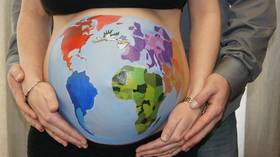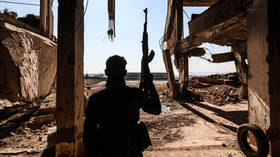Anchors aweigh: White House announces crackdown on ‘birth tourism,’ to jeers, cheers, and confusion

Mothers-to-be traveling to the US to give birth in order to obtain automatic American citizenship for their children may find themselves denied visas under controversial new rules aimed at curbing ‘birth tourism.’
Pregnant women visiting the US in order to take advantage of its “birthright citizenship” law to give birth to an American baby will be refused tourist visas under new rules that take effect Friday, the State Department has announced. Instead, they will be processed as foreigners seeking medical treatment - meaning they must prove they can afford not just medical care, but also the cost of living in the US while receiving it. They must also prove that the treatment they are receiving is not available where they come from.
The State Department “does not believe that visiting the United States for the primary purpose of obtaining US citizenship for a child, by giving birth in the United States…is a legitimate activity,” the agency said in a statement on Thursday, adding that the move is “necessary to enhance public safety, national security, and the integrity of our immigration system.” So-called birth tourism is a booming business, with some agencies charging as much as $80,000 for packages that include travel to and from the US with hotel stay, and has become especially popular among well-to-do Russian and Chinese women.
While anyone born in the US is guaranteed citizenship under the 14th Amendment to the Constitution, Trump has made no secret of his distaste for birthright citizenship. Banning visas for birth tourism is a much less controversial alternative to attempting to scrap birthright citizenship altogether. The president’s detractors nevertheless excoriated him for “going after pregnant women.”
Pregnant women.This administration is now targeting pregnant. women.When you single out the most vulnerable, the cruelty is the point. #AbolishICE#BreakUpCBPhttps://t.co/urb9WdOexV
— Alexandria Ocasio-Cortez (@AOC) January 23, 2020
I can’t begin to express how racist, anti-immigrant & population-controlling this policy denying entry to certain pregnant women is. And calling the mythical threat “birth tourism” is a gross distortion of the reality of global inequities. #reprojusticehttps://t.co/MgihqDxV6N
— Dorothy Roberts (@DorothyERoberts) January 23, 2020
Meanwhile, his supporters cheered him for taking on the thorny problem of “anchor babies” - children born in the US to foreign parents whose citizenship status is used to help relatives obtain green cards.
It's call Birth Tourism you hysterical loon, and it should be illegal.America can't afford to take care of all of its own citizens, let alone all of the people popping out anchor babies here.
— Carpe Donktum🔹 (@CarpeDonktum) January 23, 2020
Today, there are at least 4.5 million anchor babies in the U.S. under 18-years-old, exceeding the annual roughly four million American babies born every year and costing American taxpayers about $2.4 billion every year to subsidize hospital costshttps://t.co/orReD42Zwp
— truthcrusader (@truthtemptress) January 22, 2020
Others wondered how the policy would be enforced.
Why not go after these birth tourism companies instead of women? How is the us going to determine if a woman is pregnant? Ultrasound machines at immigration? So ridiculous
— ElliotT (@EDTTexas) January 23, 2020
Do tell: how do they plan to police this? These people are so gross | State Department will issue rules restricting U.S. travel for pregnant foreigners, a move the Trump administration wants to crack down on what it calls ‘birth tourism’ https://t.co/A1NFxu8XaY
— Shantel (@FashionandFaith) January 23, 2020
Some, of course, couldn’t help but to make it about Russia, noting that Trump’s buildings feature prominently in birth tourism promotions aimed at wealthy Russian women. Miami, with half a dozen ritzy Trump properties, has become a mecca for Russian birth tourists. Some wondered if he would enforce his own rule if it cut into his bottom line.
I know who the administration thinks they're going after but really, this is going to affect a lot of wealthy Russians who come to Miami to give birth. https://t.co/boOWMCFzBJ
— Julia Ioffe (@juliaioffe) January 23, 2020
State Department to Issue Rules Restricting U.S. Travel for Pregnant Foreigners - designed to crack down on what Trump calls ‘birth tourism’Not a chance this rule will be enforced for pregnant Russian women who all stay at Trump properties.https://t.co/MldLFKvQzu
— LiA (@LibsInAmerica) January 23, 2020
I wonder if he means this for the massive numbers of Russian women who go to Florida to have American children. I mean, I'm sure he doesn't, because they're not brown. https://t.co/N53Jj4NMPh
— big, structural rage (@mylittlevictory) January 23, 2020
Even as the native US birthrate continues to plummet, the rate of birth for foreign mothers is on the rise in birth tourism hotspots in the US. While official statistics do not exist, a 2012 paper estimated some 36,000 women had traveled to the US for birth tourism that year and in 2018 Florida reported a 200 percent increase in births by foreign nationals since 2000. By 2016, it was estimated that 36,000 women from China alone were coming to the US annually as birth tourists, many staying in the Los Angeles area.
Restricting birth tourism isn’t the only immigration-limitation measure the administration has in mind. Trump claimed earlier this week he is considering expanding the controversial travel ban instituted in the early weeks of his presidency to seven more countries. While he did not confirm which nations’ citizens would join Iran, Libya, Somalia, Syria, Yemen, Venezuela, and North Korea on the travel ban list, an anonymously-sourced Politico report claimed Belarus, Eritrea, Kyrgyzstan, Myanmar, Nigeria, Sudan and Tanzania would be next. The initial ban was officially adopted for national security reasons, despite many of the countries’ having no history of terrorist actions against the US; the second list is even less coherent.
Like this story? Share it with a friend!












